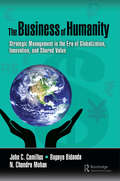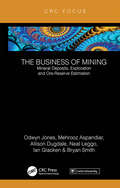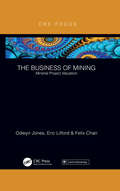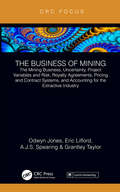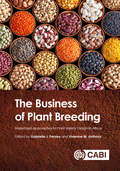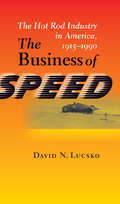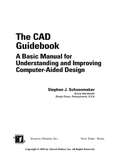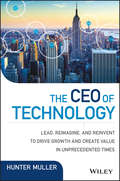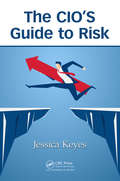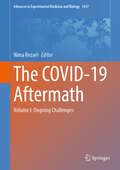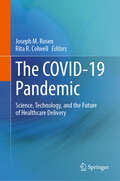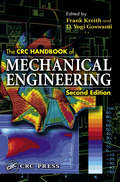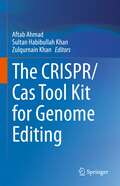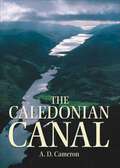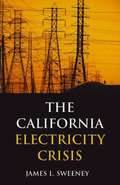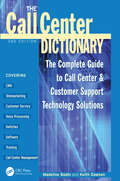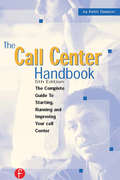- Table View
- List View
The Business of Humanity: Strategic Management in the Era of Globalization, Innovation, and Shared Value
by John Camillus Bopaya Bidanda N. Chandra MohanCompanies across the world, for a variety of reasons, are committing to incorporating social responsibility into their business models and finding that their profits are growing and their long-term sustainability is enhanced—building "humanity" into their business models as the driver of economic, environmental, and social sustainability. This fascinating development is a widely observable global phenomenon. The "Business of Humanity®" (BoH) Proposition is the synthesis of counter-intuitive but simple and powerful ideas about how companies can add value in today’s globalized and fast-changing world. The task of BoH Strategies is to overcome three critical challenges characterizing today’s business environment, namely disruptive technologies, conflicted stakeholders, and unknowable futures. BoH Strategies are designed to convert these challenges into opportunities for enhanced sustainability on all three dimensions—economic, environmental and social. Written by leading experts with decades of experience, this book: Provides a hands-on understanding of how to implement this powerful and rewarding approach to simultaneously add economic value and enhance social benefit Includes the experiences and approaches of highly regarded business executives and successful organizations Responds to the critical challenges created by three environmental mega forces – the inevitability of globalization, the imperative of innovation, and the importance of shared value. This book is based on lessons drawn from the real world and provides a compelling rationale for the power of the BoH Proposition. The pragmatic framework and process offered enable companies to develop and confidently implement value-adding strategies based on the BoH Proposition.
The Business of Mining: Mineral Deposits, Exploration and Ore-Reserve Estimation (Volume 3) (The Business of Mining)
by Bryan Smith Ifan Odwyn Jones Mehrooz Aspandiar Allison Dugdale Neal Leggo Ian GlackenThe Business of Mining complete set of three Focus books provides readers with a holistic all-embracing appraisal of the analytical tools available for assessing the economic viability of prospective mines. Each volume has a discrete focus. This third volume commences with "Our Earth, its Minerals and Ore Bodies", followed by a review of mineral exploration and sampling of mineral deposits. It continues with detailed sections covering the reporting of mineral resources and reserves in Australia, and concludes with the basic principles and application of the various methods of estimating the in-situ mineral resources and ore reserves. The books were written primarily for undergraduate applied geologists, mining engineers and extractive metallurgists and those pursuing course-based postgraduate programs in mineral economics. However, the complete series will also be an extremely useful reference text for practicing mining professionals as well as for consultant geologists, mining engineers or primary metallurgists.
The Business of Mining: Mineral Project Valuation (The Business of Mining)
by Odwyn Jones Eric Lilford Felix ChanThe Business of Mining complete set of three Focus books will provide readers with a holistic all-embracing appraisal of the analytical tools available for assessing the economic viability of prospective mines. Each volume has a discrete focus. This second volume discusses, in some depth, alternative means of assessing the economic viability of mining projects based on the best estimate of the recoverable mineral and/or fossil fuel reserves. The books were written primarily for undergraduate applied geologists, mining engineers and extractive metallurgists and those pursuing course-based postgraduate programs in mineral economics. However, the complete series will also be an extremely useful reference text for practicing mining professionals as well as for consultant geologists, mining engineers or primary metallurgists.
The Business of Mining: The Mining Business, Uncertainty, Project Variables and Risk, Royalty Agreements, Pricing and Contract Systems, and Accounting for the Extractive Industry (The Business of Mining)
by Odwyn Jones Eric Lilford Sam Spearing Grantley TaylorThe Business of Mining complete set of three Focus books will provide readers with a holistic all-embracing appraisal of the analytical tools available for assessing the economic viability of prospective mines. Each volume has a discrete focus. This first volume presents an overview of the mining business, followed by an analysis of project variables and risk, an overall coverage of the royalty agreements, pricing and contract systems followed by a final chapter on accounting standards and practises for the minerals industry. The books were written primarily for undergraduate applied geologists, mining engineers and extractive metallurgists and those pursuing course-based postgraduate programs in mineral economics. However, the complete series will also be an extremely useful reference text for practicing mining professionals as well as for consultant geologists, mining engineers or primary metallurgists.
The Business of Plant Breeding
by G. J. Persley V. M. AnthonyThe Business of Plant Breeding is the result of a study on demand-led plant variety design for markets in Africa, sharing best practices from private and public sector breeding programmes worldwide that are applicable to improving tropical crops in Africa. Beginning with an overview of the principles of demand-led plant breeding, the book then discusses aspects such as understanding the demands of clients and markets in rural and urban areas, foresight in setting product profiles and breeding targets, and determining breeding strategy and stage plans. It also covers measuring success and making the business case for future investments in breeding programmes that will deliver new varieties to meet market demands. The book: - Brings together the experience of plant breeders around the world, representing universities, national plant breeding programmes, regional and international agricultural research institutes, and private seed companies, showcasing how to respond to changing market demands; - Provides educational resource materials within each chapter; - Includes templates for use as planning tools by plant breeding programs for determining priority traits that meet market demands. An important read for professionals and students of plant breeding and genetics, this book is also a useful resource for anyone interested in developing and disseminating new, market-led technologies to increase productivity and profitability in tropical agriculture. The study was sponsored by the Australian Centre for International Agricultural Research, the Crawford Fund and the Syngenta Foundation for Sustainable Agriculture, and managed by the University of Queensland.
The Business of Speed: The Hot Rod Industry in America, 1915–1990 (Johns Hopkins Studies in the History of Technology)
by David N. Lucsko2009 Outstanding Academic Title, ChoiceSince the mass production of Henry Ford’s Model T, car enthusiasts have been redesigning, rebuilding, and reengineering their vehicles for increased speed and technical efficiency. They purchase aftermarket parts, reconstruct engines, and enhance body designs, all in an effort to personalize and improve their vehicles. Why do these car enthusiasts modify their cars and where do they get their aftermarket parts? Here, David N. Lucsko provides the first scholarly history of America’s hot rod business. Lucsko examines the evolution of performance tuning through the lens of the $34-billion speed equipment industry that supports it. As early as 1910, dozens of small shops across the United States designed, manufactured, and sold add-on parts to consumers eager to employ new technologies as they tinkered with their cars. Operating for much of the twentieth century in the shadow of the Big Three automobile manufacturers—General Motors, Ford, and Chrysler—these businesses grew at an impressive rate, supplying young and old hot rodders with thousands of performance-boosting gadgets. Lucsko offers a rich and heretofore untold account of the culture and technology of the high-performance automotive aftermarket in the United States, offering a fresh perspective on the history of the automobile in America.
The Business of Waste
by Raymond G. Stokes Roman Köster Stephen C. Sambrook Raymond G. Stokes Roman KösterThe advent of consumer societies in the United Kingdom and West Germany after 1945 led to the mass 'production' of garbage. This book compares the social, cultural and economic fallout of the growing volume and changing composition of waste in the two countries from 1945 to the present through sustained attention to changes in the business of handling household waste. Though the UK and Germany are similar in population density, degrees of urbanisation, and standardisation, the two countries took profoundly different paths from low-waste to throwaway societies, and more recently, towards the goal of 'zero-waste'. The authors explore evolving balances between public and private provision in waste services; the transformation of public cleansing into waste management; the role of government legislation and regulation; emerging conceptualisations of recycling and resource recovery; and the gradual shift of the industry's regulatory and business context from local to national and then to international.
The Byte-Sized World of Technology (Fact Attack #2)
by Melvin Berger Gilda Berger Sarah Watanabe-RoccoDid you know more people have cell phones than toothbrushes? That Google answers about a billion questions a day? Or that Alexander Graham Bell wanted the standard telephone greeting to be "Ahoy"?Discover these incredible facts and more in the next Fact Attack book, all about inventions and technology. Fact Attack is an exploration of the most amazing and awe-inspiring facts about technology and inventions throughout history. Heavily designed with different approaches on each page, the style is dynamic, fresh, and in your face. Whether you flip to a page to learn a digestible fact or read it from beginning to end, this is a book a reader will return to time and again.
The CAD Guidebook: A Basic Manual for Understanding and Improving Computer-Aided Design
by Stephen J. SchoonmakerCovering how to implement, execute, adjust, and administer CAD systems, The CAD Guidebook presents fundamental principles and theories in the function, application, management, and design of 2- and 3-D CAD systems. It illustrates troubleshooting procedures and control techniques for enhanced system operation and development and includes an extensiv
The CEO of Technology: Lead, Reimagine, and Reinvent to Drive Growth and Create Value in Unprecedented Times
by Hunter MullerThe CIO playbook, with lessons from the world's best leaders The CEO of Technology shows today's CIOs how to become exceptional leaders and bring value to their organization. By taking lessons from some of the world's best CEOs, you'll develop the traits and characteristics that drive legendary leadership. Interviews with top executives at leading global technology companies including Apple, Boeing, Direct TV, Facebook, Texas Instruments, and more provide deep and valuable insight into what it means to lead in a hyper-driven tech environment. These stories provide valuable lessons that don't come from a classroom, but only from the in-the-trenches experience of the world's best leaders—coupled with a groundbreaking leadership approach designed for the demands of today's markets, to give you the ultimate CIO handbook. You'll learn how to maximize the value of your greatest asset—your team—and how to drive performance to unprecedented levels. You'll discover how great leaders communicate business strategy across the modern enterprise, and become a driving force behind your organization's success. The IT industry is experiencing a seismic shift that is revolutionizing the way companies do business. The stakes are high, everything is in flux, and there are no guaranteed paths to success. Whether this revolution means crisis or opportunity is up to you; this book gives you a game-changing approach to IT leadership in the 21st century enterprise. Improve the quality of your leadership and strengthen the C-suite bond Attract top talent, build great teams, and align IT with overall strategic vision Become the indispensable leader who consistently drives achievement Integrate technology and business strategy to become a high-value CIO Modern CIOs face a radically new array of leadership challenges in today's ultra-competitive, highly volatile markets; are you capable of leading the charge to the top? The CEO of Technology offers a visionary approach and the wisdom of experience to help you join the ranks of great leaders.
The CIO’s Guide to Risk
by Jessica KeyesIn an age of globalization, widely distributed systems, and rapidly advancing technological change, IT professionals and their managers must understand that risk is ever present. The key to project success is to identify risk and subsequently deal with it. The CIO’s Guide to Risk addresses the many faces of risk, whether it be in systems development, adoption of bleeding edge tech, the push for innovation, and even the march toward all things social media. Risk management planning, risk identification, qualitative and quantitative risk analysis, contingency planning, and risk monitoring and control are all addressed on a macro as well as micro level. The book begins with a big-picture view of analyzing technology trends to evaluate risk. It shows how to conceptualize trends, analyze their effect on infrastructure, develop metrics to measure success, and assess risk in adapting new technology. The book takes an in-depth look at project-related risks. It explains the fundamentals of project management and how project management relates to systems development and technology implementation. Techniques for analyzing project risk include brainstorming, the Delphi technique, assumption analysis, and decision analysis. Metrics to track and control project risks include the Balance Scorecard, project monitoring and reporting, and business and technology metrics. The book also takes an in-depth look at the role of knowledge management and innovation management in identifying, assessing, and managing risk. The book concludes with an executive’s guide to the legal and privacy issues related to risk management, as well overviews of risks associated with social media and mobile environments. With its checklists, templates, and worksheets, the book is an indispensable reference on risk and information technology.
The COVID-19 Aftermath: Volume I: Ongoing Challenges (Advances in Experimental Medicine and Biology #1457)
by Nima RezaeiThis book discusses different challenges imposed to the globe following the COVID-19 pandemic. Coronavirus disease 2019 (COVID-19) has affected humans’ individual lives, communities, and the world. It has not only affected human’s lives but also environmental and natural systems. To better appreciate the pandemic’s influence, multidisciplinary and interdisciplinary approaches are needed. Also, lessons learned from facing the pandemic are reviewed to be used for combating the upcoming challenges in healthcare settings, mental and psychological health, education, natural resources, energy system, environment balance, economic stability, social relations, etc.
The COVID-19 Pandemic: Science, Technology, and the Future of Healthcare Delivery
by Rita R. Colwell Joseph M. RosenThis book provides an overview of the science and technology that helps us understand the trajectory, i.e., genomics, epidemiology, and health care of the COVID-19 pandemic, its virus, and pathogenicity. Topics that are covered include how the virus is impacting our health care system and the economy. Simulation modeling used to predict the spread of the virus and risk of infection in America and globally is included, as well as the critical role of communication in pandemic response. An important focus is synthetic biology, notably employed in the development and production of effective diagnostics that can be rapidly deployed and development of vaccines in unlimited quantity. US and global production of vaccine is discussed. Most importantly, treatment of patients infected with the virus that includes telemedicine and virtual reality for remote intensive care settings is a significant aspect of the discussion. Biotechnology plays a major role in responding to the COVID-19pandemic and advances utilized in the engineering sciences are introduced.
The CRC Handbook of Mechanical Engineering (Handbook Series for Mechanical Engineering)
by D. Yogi Goswami Frank KreithThe second edition of this standard-setting handbook provides and all-encompassing reference for the practicing engineer in industry, government, and academia, with relevant background and up-to-date information on the most important topics of modern mechanical engineering. These topics include modern manufacturing and design, robotics, computer engineering, environmental engineering, economics, patent law, and communication/information systems. The final chapter and appendix provide information regarding physical properties and mathematical and computational methods. New topics include nanotechnology, MEMS, electronic packaging, global climate change, electric and hybrid vehicles, and bioengineering.
The CRISPR/Cas Tool Kit for Genome Editing
by Aftab Ahmad Sultan Habibullah Khan Zulqurnain KhanThis book discusses CRISPR/Cas- one of the most powerful tools available to scientists for genome editing. CRISPR/Cas is not only a genome editing tool, but researchers have also engineered it for gene regulation, genome imaging, base editing and epigenome regulations. This book describes the entire toolkit for CRISPR/Cas. The opening section gives an introduction to the technique and compares it with other genome editing tools. Further section gives a historical perspective of the tool, along with its detailed classification. The next chapters describe bioinformatic tools in CRISPR/Cas, and delivery methods for CRISPR/Cas. The book also discusses about the applications of CRISPR/Cas beyond genome editing and use of CRISPR for rewriting genetic codes. The book dedicates a section to the use of CRISPR in plants. The book culminates with a chapter on the current status, challenges and shortcomings of the CRISPR/Cas genome editing tool. The book would be highly interesting to students and researchers in molecular biology, biochemistry, biotechnology, food science, agriculture and plant sciences.
The Cage
by Megan ShepherdThe Maze Runner meets Scott Westerfeld in this gripping new series about teens held captive in a human zoo by an otherworldly race. From Megan Shepherd, the acclaimed author of The Madman's Daughter trilogy.When Cora Mason wakes in a desert, she doesn't know where she is or who put her there. As she explores, she finds an impossible mix of environments--tundra next to desert, farm next to jungle, and a strangely empty town cobbled together from different cultures--all watched over by eerie black windows. And she isn't alone.Four other teenagers have also been taken: a beautiful model, a tattooed smuggler, a secretive genius, and an army brat who seems to know too much about Cora's past. None of them have a clue as to what happened, and all of them have secrets. As the unlikely group struggles for leadership, they slowly start to trust each other. But when their mysterious jailer--a handsome young guard called Cassian--appears, they realize that their captivity is more terrifying than they could ever imagine: Their captors aren't from Earth. And they have taken the five teenagers for an otherworldly zoo--where the exhibits are humans.As a forbidden attraction develops between Cora and Cassian, she realizes that her best chance of escape might be in the arms of her own jailer--though that would mean leaving the others behind. Can Cora manage to save herself and her companions? And if so . . . what world lies beyond the walls of their cage?
The Calculus Wars: Newton, Leibniz, and the Greatest Mathematical Clash of All Time
by Jason Socrates BardiThis vibrant and gripping history ultimately exposes how these twin mathematical giants (Newton, Leibniz) were proud, brilliant, at times mad, and in the end completely human.
The Calculus: A Genetic Approach
by Otto ToeplitzWhen first published posthumously in 1963, this bookpresented a radically different approach to the teaching of calculus. In sharp contrast to the methods of his time, Otto Toeplitz did not teach calculus as a static system of techniques and facts to be memorized. Instead, he drew on his knowledge of the history of mathematics and presented calculus as an organic evolution of ideas beginning with the discoveries of Greek scholars, such as Archimedes, Pythagoras, and Euclid, and developing through the centuries in the work of Kepler, Galileo, Fermat, Newton, and Leibniz. Through this unique approach, Toeplitz summarized and elucidated the major mathematical advances that contributed to modern calculus. Reissued for the first time since 1981 and updated with a new foreword, this classic text in the field of mathematics is experiencing a resurgence of interest among students and educators of calculus today.
The Caledonian Canal: In The Great Glen
by A.D. CameronAn exploration of the history of the sixty-mile, Scottish Highland canal and its significance to the region&’s transportation and tourism. Thomas Telford&’s plan, to connect Loch Ness, Loch Oich, and Loch Lochy with each other and the sea, was a huge undertaking that brought civil engineering to the Highlands on a heroic scale. Deep in the Highlands, far from the canal network of England, engineers forged their way through the Great Glen to construct the biggest canal of its day: twenty-two miles of artificial cutting and no fewer than twenty-eight locks. A.D. (Sandy) Cameron&’s book has long been recognized as the authoritative work on the canal as well as a reliable and useful guide to the surrounding area. There are intriguing old plans, not discovered until 1992, and a survey of the dramatic rise in pleasure-craft traffic during the last two decades. But the highlight of the recent past was undoubtedly the Tall Ships passing through the canal in stately procession in 1991. Impossible, then, not to feel the fascination of this beautiful waterway: a working piece of industrial history and a remarkable engineering achievement. This book is a fitting celebration of this remarkable feat of engineering.
The California Electricity Crisis
by James L. SweeneySweeney addresses four main topics: the current situation in California, the history of California's energy, the consequences of decisions that are being made, and what we should or shouldn't do about it.
The Call Center Dictionary: The Complete Guide to Call Center and Customer Support Technology Solutions
by Madeline BodinCall centres have become the crucial front line for managing customer relationships. This book covers a range of call center terminology. It explains relevant terms, and provides the call center manager with a quick reference that covers the technology and operational issues that come up in running and improving a call center.
The Call Center Handbook
by Keith DawsonThis book is for people who work in a call center and common traits the call center location must offer. It contains practical observations about how to use particular technologies, and ideas about how to run the call center, which has become its own corporate discipline.
The Call Center Handbook: The Complete Guide to Starting, Running, and Improving Your Call Center
by Keith DawsonNeed to know how to buy a phone switch for your call center? How to measure the productivity of agents? How to choose from two cities that both want your center? No problem. The Call Center Handbook is a complete guide to starting, running, and im
The Call that Started It All (Fountas & Pinnell Classroom, Guided Reading Grade 5)
by Suzanne SladeThe Day Everything Changed It's getting dark and you need a ride. If it's 1973, you go to a pay phone, drop in some change, and call home. Today you make a call on a phone you carry with you and all you need to worry about is a dead battery. NIMAC-sourced textbook
The Cambridge Companion to Benjamin Franklin
by Carla MulfordComprehensive and accessible, this Companion addresses several well-known themes in the study of Franklin and his writings, while also showing Franklin in conversation with his British and European counterparts in science, philosophy, and social theory. Specially commissioned chapters, written by scholars well-known in their respective fields, examine Franklin's writings and his life with a new sophistication, placing Franklin in his cultural milieu while revealing the complexities of his intellectual, literary, social, and political views. Individual chapters take up several traditional topics, such as Franklin and the American dream, Franklin and capitalism, and Franklin's views of American national character. Other chapters delve into Franklin's library and his philosophical views on morality, religion, science, and the Enlightenment and explore his continuing influence in American culture. This Companion will be essential reading for students and scholars of American literature, history and culture.
